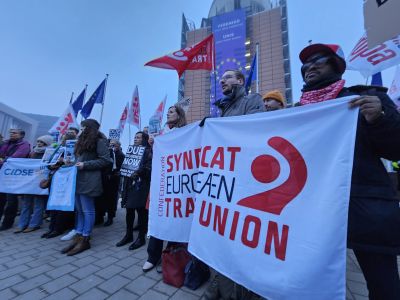Corporate lobbyists will outnumber representatives of trade unions and NGOs by five to one at today’s simplification roundtable on European Commission plans to weaken laws protecting workers and the environment that are needed to prevent tragedies like the Rana Plaza disaster.
Lobbyists for big oil companies like ExxonMobil and Total Energies will be among 57 business representatives at the roundtable being held by the Commission – that compares to just two trade union representatives and 10 NGOs. None of the sustainable businesses requesting EU law for fair and sustainable competition were invited.
Happening now: trade unions are outside the EU Commission to stop the corporate push to cancel legislation holding them accountable to the rights of working people.
— European Trade Unions (@etuc-ces.bsky.social) February 6, 2025 at 10:45 AM
[image or embed]
The simplification roundtable intends to present the first 'omnibus initiative' in the Commission's Competitiveness Compass which includes the possibility of re-opening two important directives:
- Corporate Sustainability Due Diligence Directive (CS3D) which requires large companies to identify and mitigate risks of human rights and environmental violations, and to remediate instances these impacts when they occur. It applies to about 5,500 EU and non-EU companies with at least 1,000 employees and €450 million annual turnover.
- Corporate Sustainability Reporting Directive (CSRD) which expands existing laws that creates an obligation for large companies to report on the impact on the environment of the companies’ operations.
Before attending today’s meeting, Isabelle Schömann, Deputy General Secretary of the European Trade Union Confederation (ETUC), joined a protest at Schuman Square to raise the alarm over the corporate capture of EU policymaking.
The ETUC calls on the European Commission not to open previously democratically agreed legislation, such as the Corporate Sustainability Due Diligence Directive, that deliver for workers and for sustainable business in compliance with the climate targets.
The European Commission must also apply its own Better Regulation rules, which commit to “evidence-based, transparent EU law-making”. Before passing new laws, the Commission is also supposed to undertake a proper impact assessment and evaluation of existing legislation after their transposition phase.
ETUC Deputy General Secretary Isabelle Schömann said:
“With a meeting stacked full of corporate lobbyists, it is clear that this simplification roundtable does not live up to the European Commission’s mandate to deliver for the general interest. It is also not proposing proper implementation and enforcement, nor evidence-based policymaking and is designed to arrive at a predetermined decision for the sake of simplifying.
“This is a deregulation agenda. The general interest as well as the human rights dimension are being totally overlooked in favour of the demands of a few big businesses with a history of violating workers’ rights and polluting the environment.
“The EU’s CS3D and CSRD and taxonomy, which apply to only the very largest companies, were put in place after a long process of proper public consultation, democratic scrutiny and impact assessments. They should not be re-opened nor re-written through the backdoor after a rigged simplification roundtable and an omninbus process which is not transparent or democratic and appears to be a Trojan horse.
“I call on the European Commission not to lose sight of the fact that the CS3D, CSRD and taxonomy were introduced to protect and promote human rights in business operations in order to prevent a repeat of tragedies like the Rana Plaza disaster, in which over 1,100 people lost their lives because companies did not do their due diligence on abuses in their supply chains.”

